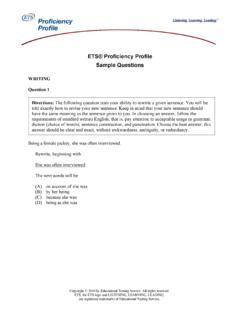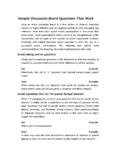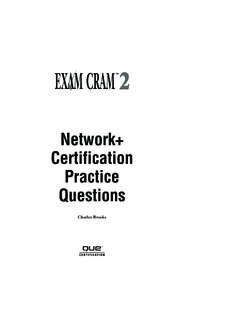Transcription of Items Needed Opening Activity/Dialogue Content
1 Items Needed Copies of OKMM s Your Money Matters high school guide for each of Friend or Foe? Opening Activity/Dialogue Have you or someone you know ever been a victim of identity theft?Do you worry about becoming an identity theft victim?Some studies cite that one-third of identity theft victims are under the age of 30. Why do you think that s the case? Content Identity theft occurs when someone uses your personal information, like your name, Social Security number (SSN) or credit card number, without your permission to commit fraud or other this lesson you ll show your students: How to prevent identity theft. The importance of using strong passwords for online accounts. The reason they should be cautious when giving out personal information. How to protect their the Content on page 13 of the high school Your Money Matters guide to educate your students about avoiding identity theft.
2 Ask your students to read the information on page 13 and be prepared to discuss the following questions. Why are you cautioned against putting personal information on social media sites? How could an identity thief use this information? Besides not carrying around your Social Security card, what are some ways you can protect your number? Why do experts recommend you check your credit report regularly? Do you currently use strong passwords? How do you protect your identity when shopping online? High SchoolIdentity Theft ActivityApplicationNow that your students have a basic understanding about avoiding identity theft, use the Friend or Foe? worksheet to help them better understand how information posted on social networking sites can be used by identity thieves. This exercise isn t intended to discourage them from using these sites; the purpose is to help them think twice about the information they willingly share with friends and anyone else who s looking.
3 Encourage them to work in groups of two or more and highlight keywords or information that could be used to help someone fraudulently use their personal information. activity AnswersYour students may have highlighted the following words: Nikki Green: Of course, you can t avoid using your name; however, students can avoid using middle initials that might make obtaining information easier for an identity thief. Birthday: Encourage students to only use the date, not the year. However, even with just the date, a savvy thief could guess the year you were born. Hometown, school name and mascot: Many websites, like banks and credit card companies, have additional security questions that often include the high school you attend(ed) or mascot name. Tattoo, Terrier named Oreo: Students who don t use strong passwords may turn to easy to remember passwords like TattooHappy or IHeartOreo for their passwords.
4 Pampered Chef: When calling to switch services or change account information, some institutions may ask you to verify your place of employment. About: Much of the information listed in this paragraph could be used to gain access to more personal information. Security questions often involve your favorite animal (dog), favorite pastime (reading) or particular interest (politics). Again, remind your students that this exercise isn t meant to scare them away from social media. They just need to be aware of the information they are making public and how it can be used to gain access to their personal finances. To request classroom copies of Oklahoma Money Matters Your Money Matters guide, call or email To learn more about OKMM, visit our website, or Foe?Identity Theft ActivitySocial media sites are great ways to share pictures and news with your friends and family, but they can also be great places for identify thieves to locate personal information and steal your identity.
5 Many times identity thieves aren t strangers; they have relationships with their victims! It s silly to completely ban the use of social media for fear of becoming an identity theft victim, but you can take precautions to make sure you aren t over-sharing. Use the following screenshot--based on an actual Facebook profile--and highlight words, sentences or phrases you think could be used to help an identity thief gain access to your information.






